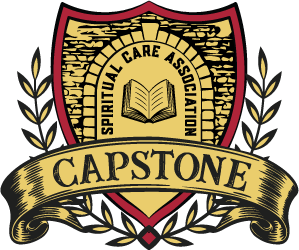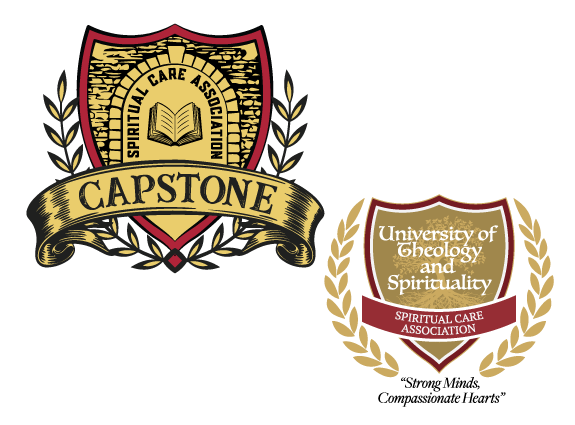
Grievance Procedures
Students with unresolved grievances may file an appeal with the Academic Dean and the Provost. Include a description of the concern, attempts to resolve it, and the desired outcome. Please submit grievances within thirty (30) days of the incident. The CAPSTONE President will issue the institution’s final decision.
Students may contact CAPSTONE by phone at (253) 442-6850 or by mail to CAPSTONE University 2607 Bridgeport Way West, Suite 1-A, University Place, WA 98466.
Title IX Grievance Procedure
Notice: If you believe that you have experienced or witnessed harassment or sexual violence, notify your instructor, supervisor, or the Title IX Coordinator as soon as possible after the incident. Do not allow an inappropriate situation to continue by not reporting it, regardless of who is creating the situation. No employee, contract worker, student, vendor, or other person who does business with the institution is exempt from the prohibitions in this policy. Supervisors are required to refer all student harassment complaints to the Title IX Coordinator. In order to facilitate the investigation, your complaint should include details of the incident or incidents, names of the individuals involved and names of any witnesses. Actual Notice has occurred once the Title IX Coordinator has knowledge, or any other official who has the authority to institute corrective measures on behalf of the institution has notice.
Title IX Formal or Informal Process: In some cases, if the situation warrants the institution may offer an informal process only after a formal complaint has been filed. All parties to the complaint must give voluntary, informed, written consent to proceed to an informal process. All parties will be given written notice disclosing the allegation, the requirements of the informal resolution process including any consequences of participating in the informal process which may include the forfeiture of any formal process rights. Additionally, any party may withdrawal from the informal process to resume the formal grievance process at any time with written notice to the Title IX Coordinator. Informal process will not be offered in the case of a formal complaint involving allegations that an employee sexually harassed a student.
Title IX Supportive Measures
Supportive measures may include:
- Referral to counseling, medical, and/or other health services
- Offering adjustments to academic deadlines, course schedules, etc.
- Academic Support
- Financial Aid Counseling
- Modifying class or work schedules
- Placing mutual restrictions on contact between the parties
- Changing work or housing locations
- Providing leaves of absence
- Implementing contact limitations (no contact orders) between the parties
Personnel
- Title IX Coordinator
- Investigator(s)
- Decision Maker (Adjudicator)
- Facilitator
- Advisor to the parties
Title IX Grievance Procedures
- All parties will be treated equitably. The goal of remedies is to provide, preserve or restore equal access to education and activities.
- Objective evaluation of evidence. The grievance process will ensure objective evaluation of all relevant evidence. Credibility will not be determined based on status as a complainant, respondent, or witness.
- All personnel are trained using approved materials. The training materials are available in the Title IX hearing personnel training.
Title IX Hearing Personnel Training: All personnel involved in the live hearing process will attend training in order to effectively perform their duties.
Presumption of Innocence: A Respondent is presumed not responsible, any finding of responsibility will come at the conclusion of the grievance process.
Title IX Harassment Time Frame of Process
- Notification happens
- Investigation conducted within 5 days and
- Written results of investigation will be given to all parties to the complaint within 30 days of Notification
- Hearing will be set within 5 days of results of investigation and be completed not more than 25 days
- Results from hearing will be delivered in writing to all parties by the Title IX Coordinator within 10 days of conclusion of live hearing.
- The entire process will generally take no more than sixty (60) days.
- From time-to-time delays or extensions of our time frames may be necessary. Delays or extensions of the institution’s will be “temporary,” “limited,” and “for good cause,” and we will notify all parties of the reason for any such short-term delay or extension.
Range of Outcomes
- Warning or censure
- Disciplinary probation
- Loss of privileges or exclusion from services or organizations
- Restrictions
- Suspension
- Dismissal or expulsion – For students this may include removal from or expulsion from school including any school resources, all rights and privileges the University provides, and any other services the University provides, present or future
- Holds on enrollment or registration, degree’s, and transcripts
In the case of any employee or faculty up to and including termination. Repeated behavior will be subject to any and all of the above as appropriate.
Title IX Standard of Evidence: CAPSTONE has adopted a Preponderance of Evidence standard for determining responsibility for all formal sexual harassment proceedings. This standard of evidence will be used in all formal proceedings whether the respondent is a student, employee, or faculty member.
Title IX Right to Appeal: Every Party has the right to appeal the result of a grievance decision. The party must file an appeal, in writing, with the Title IX Coordinator within 15 days of the decision. The Title IX Coordinator shall issue a written decision in response to the appeal no later than 30 days after its filing.
Title IX Investigation of Complaints: All notifications of Harassment are investigated by trained team-members of the institution to determine if immediate supportive measures need to be taken, or to stop, prevent and remedy the situation. Investigation does not necessarily lead to formal grievance complaint, the complainant has a choice to in many circumstances decide to pursue formal, informal, or no further investigation depending on the severity of the issue the Title IX Coordinator may need to escalate but will do everything in their power to keep the investigation private. Investigators are either the Title IX coordinator or picked from trained team members. Conflict of interest as well as expertise in certain areas are considered in the assignment of an investigator. See Anti-Harassment and Discrimination Policy, Time Frame of Process, Harassment process flowchart, or Title IX Training Documents for more information.
Title IX Retaliation Prohibited: SCA UTS will not retaliate against you for filing a complaint and will not tolerate retaliation by students or employees. If you believe you have been retaliated against, you should promptly notify your supervisor and Human Resources or the Title IX Coordinator.
Title IX Reporting Requirements: Victims of sexual misconduct should be aware that the institution’s administrators must issue timely warnings for incidents reported to them that pose a substantial threat of bodily harm or danger to other members of the campus community. SCA UTS will make every effort to ensure that a victim’s name and other identifying information is not disclosed, while still providing enough information for community members to make safety decisions in light of the danger. SCA UTS reserves the right to notify parents/guardians of dependent students regarding any health or safety risk, or a change in student status.
Title IX Additional Information: Employees should contact Human Resources for more information, or any questions related to this policy. Students may contact the Title IX Coordinator with any questions related to this policy. In addition, the U.S. Department of Education Office for Civil Rights (“OCR”) investigates complaints of unlawful harassment of students in educational programs or activities. This agency may serve as a neutral fact finder and will attempt to facilitate the voluntary resolution of disputes with the parties. For more information, visit the OCR website at: http://www.hhs.gov/ocr/.
American with Disabilities (ADA) Policy
CAPSTONE does not discriminate in admission or access to our program on the basis of age, race, color, sex, disability, religion, sexual orientation, national origin, or any other category protected by local, state, or federal laws. Applicants who are persons with disabilities, as defined in paragraph 104.3(j) of the regulation under Section 504 of the Rehabilitation Act of 1973, may apply for admittance into the program. CAPSTONE will work with the applicant or student to determine whether reasonable accommodations can be effective and/or are available.
CAPSTONE ADA Compliance Coordinator is responsible for coordinating compliance with Section 504 of the Rehabilitation Act of 1973 and Title III of the Americans with Disabilities Act of 1990.
Requests for Accommodation:
If you would like to request academic adjustment or auxiliary aids, please contact the Office of the Registrar. You may request academic adjustments or auxiliary aids at any time. Any qualified individual with a disability requesting an accommodation or auxiliary aid or service should follow this procedure:
- Notify the Office of the Registrar in writing of the type of accommodation needed, date needed, documentation of the nature and extent of the disability, and of the need for the accommodation or auxiliary aid. The request should be made at least four weeks in advance of the date needed.
- The Office of the Registrar will respond within two weeks of receiving the request.
- If you would like to request reconsideration of the decision regarding your request, please contact the Office of the Registrar within one week of the date of the response. Please provide a statement of why and how you think the response should be modified.
Internal Grievance Procedure
It is the institution’s policy not to discriminate on the basis of disability. CAPSTONE has adopted an internal grievance procedure providing for prompt and equitable resolution of complaints alleging any action prohibited by Section 504 of the Rehabilitation Act of 1973 (29 U.S.C. 794).
Section 504 prohibits discrimination on the basis of disability in any program or activity receiving Federal financial assistance. Any person who believes she/he has been subjected to discrimination on the basis of disability may file a grievance pursuant to the procedure outlined below. CAPSTONE will not retaliate against anyone who files a grievance in good faith or cooperates in the investigation of a grievance.
Procedure: Grievances must be submitted to the University within thirty (30) days of the date, the person filing the grievance becomes aware of the alleged discriminatory action.
A complaint must be in writing, containing the name and address of the person filing it. The complaint must state the problem or action alleged to be discriminatory and the remedy or relief sought.
The Section 504 Grievance Compliance Coordinator (or designee) shall investigate the complaint (i.e., identify and obtain relevant evidence, identify, and obtain statements from relevant witnesses) and afford all interested persons an opportunity to submit relevant evidence. The Complainant may also present witnesses relative to the complaint. The Section 504 Grievance Compliance Coordinator will maintain the files and records relating to such grievances. The Section 504 Grievance Compliance Coordinator will issue a written decision on the grievance no later than 30 days after its filing. The person filing the grievance may appeal the decision of the Section 504 Grievance by writing to CAPSTONE Director, Rev. William Greaver (2607 Bridgeport Way West, Suite 1-A, University Place, WA 98466) within 15 days of receiving the Section 504 Grievance Coordinator’s decision. CAPSTONE shall issue a written decision in response to the appeal no later than 30 days after its filing.
The availability and use of this grievance procedure do not prevent a person from filing a complaint of discrimination on the basis of disability with the U. S. Department of Education, Office for Civil Rights. A student or any member of the public may also file a complaint about this institution with the Washington Student Achievement Counsel by calling (360) 753-7800 or by completing a complaint form, which can be obtained on the Counsel’s Internet website wsac.wa.gov.
CAPSTONE will take all steps to prevent recurrence of any harassment or other discrimination and to correct discriminatory effects where appropriate. CAPSTONE will make appropriate arrangements to ensure that disabled persons are provided other accommodations, if needed, to participate in this grievance process. The Section 504 Compliance Coordinator will be responsible for such arrangements.
Anti-Harassment and Discrimination Policy (for Students and Employees)
CAPSTONE is committed to providing a work and school environment free of unlawful harassment or discrimination. CAPSTONE policy prohibits harassment or discrimination based on race, religion, creed, color, national origin, ancestry, sex (including pregnancy, childbirth, or related medical conditions), military or veteran status, physical or mental disability, medical condition, marital status, age, sexual orientation, gender, gender identity or expression, genetic information or any other basis protected by the federal, state, or local law.
CAPSTONE anti-harassment policy applies to all persons involved in the operation of the institution and prohibits unlawful harassment by any employee of the institution, as well as students, customers, vendors, or anyone who does business with the institution. It further extends to prohibit unlawful harassment by or against students. Any employee, student or contract worker who violates this policy will be subject to disciplinary action. To the extent a customer, vendor, or other person with whom the institution does business engages in unlawful harassment or discrimination, the institution will take appropriate corrective action.
As part of the institution’s commitment to providing a harassment-free working and learning environment, this policy shall be disseminated to the institution’s community through publications, and other appropriate channels of communication.
Investigation of Complaints: In response to all complaints, the institution promises prompt and equitable resolution through a reliable and impartial investigation of complaints, including the opportunity for both parties to present witnesses or other evidence. The time necessary to conduct an investigation will vary based on complexity but will generally be completed within sixty (60) days of receipt of the complaint. CAPSTONE shall maintain confidentiality for all parties to the extent possible, but absolute confidentiality cannot be guaranteed. In cases where a student does not give consent for an investigation, CAPSTONE will weigh the student’s request for confidentiality against the impact on school safety to determine whether an investigation must proceed. Complainants should be aware that in a formal investigation due process generally requires that the identity of the charging party and the substance of the complaint be revealed to the person charged with the alleged harassment. Both parties will receive written notice of the outcome of the complaint.
During the investigation, CAPSTONE will provide interim measures, as necessary, to protect the safety and wellbeing of students and/or employees involved.
If CAPSTONE determines that unlawful harassment or sexual violence has occurred, immediate appropriate corrective action will be taken in accordance with the circumstances involved, and CAPSTONE will take steps to prevent the recurrence of any harassment or discrimination. Any employee determined by CAPSTONE to be responsible for unlawful harassment or discrimination will be subject to appropriate disciplinary action, up to and including termination. Remedies for student-related claims may include, but are not limited to, an order to stay away, suspension or expulsion.
To initiate a criminal investigation, reports of sexual violence should be made to “911” or local law enforcement. The criminal process is separate from the institution’s disciplinary process. To the extent that an employee or contract worker is not satisfied with the institution’s handling of a harassment or discrimination complaint, they may also contact the appropriate state or federal enforcement agency for legal relief.
Retaliation Prohibited: CAPSTONE will not retaliate against you for filing a complaint and will not tolerate retaliation by students or employees. If you believe you have been retaliated against, you should promptly notify your supervisor, or the Title IX Coordinator.
Reporting Requirements: Victims of sexual misconduct should be aware that the institution’s administrators must issue timely warnings for incidents reported to them that pose a substantial threat of bodily harm or danger to other members of the campus community. CAPSTONE will make every effort to ensure that a victim’s name and other identifying information is not disclosed, while still providing enough information for community members to make safety decisions in light of the danger. CAPSTONE reserves the right to notify parents/guardians of dependent students regarding any health or safety risk, or a change in student status.
Additional Information: Employees should contact Human Resources for more information, or any questions related to this policy. Students may contact the Title IX Coordinator with any questions related to this policy. In addition, the U.S. Department of Education Office for Civil Rights (“OCR”) investigates complaints of unlawful harassment of students in educational programs or activities. This agency may serve as a neutral fact finder and will attempt to facilitate the voluntary resolution of disputes with the parties. For more information, visit the OCR website at: http://www.hhs.gov/ocr/.


